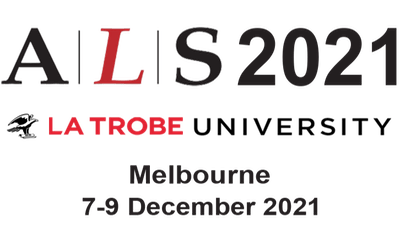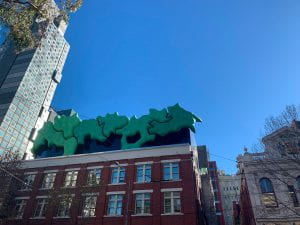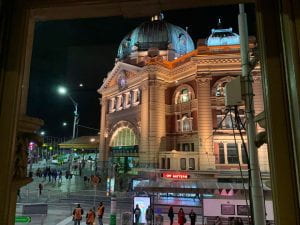
Conference – Australian Linguistic Society annual conference (ALS)
The Research Hub for Language in Forensic Evidence will be presenting our work at the upcoming 2021 Australian Linguistic Society annual conference (ALS). This is going to be fully online, hosted by La Trobe University Melbourne, and will run from Dec 7-Dec 9.
Our papers on forensic linguistic topics are (times listed in AEDT):
Tuesday 7 Dec – poster session, 3pm-4pm
Forensic audio and perception: an analysis of factors that can help listeners to “hear” words in indistinct forensic audio (Conor Clements, Debbie Loakes and Helen Fraser).
This presentation will be an extension of Conor Clements’ 2020 Honours work which he has written about here. He will go more deeply into some reasons for the priming experienced by participants in his study (both acoustic and perceptual reasons).
Wed 8 Dec Applied Linguistics session, 11am
Misconceptions in high places: why the law allows police transcripts to ‘assist’ juries to hear indistinct forensic audio – and how linguists can help change it (Helen Fraser)
The title of this talk gives a clear idea of what Helen will be covering. She has also written about these issues in an open access paper (Fraser 2021) called The development of legal procedures for using a transcript to assist the jury in understanding indistinct covert recordings used as evidence in Australian criminal trials: A history in three key cases. To give a little taster of what the talk will be about, here is some of the abstract from this paper:
“The use of police transcripts to assist a jury in determining the content of indistinct forensic audio is a cause of concern to many in forensic linguistics. A common recommendation is that the law should make more use of transcripts produced by experts in linguistic science. While this can help in individual cases, it is not a general solution. In fact, it can make things worse instead of better. That is because it fails to take account of legal procedures which are little known in forensic linguistics, and the misconceptions about language that they embody”.
Thursday December 9 Computing session, 11am
Humans versus computers: misconceptions in the world of transcription (Debbie Loakes)
This talk is an extension of my work on what happens when we try to use Automatic Speech Recognition (ASR) with indistinct forensic audio. In the ALS talk, I will be explaining some of the linguistic and computational reasons that this does not work. You can also listen to a talk I did at the International Association of Forensic Phonetics conference – see this previous blog entry. We are continuing to extend this work in the Hub, also with the assistance of Hywel Stoakes.
Tuesday 7 Dec – 5th Language Variation and Change – Australia (LVCA-5) workshop, 10am
Along with Adele Gregory and Kirsty McDougall (also see here) I am also giving a talk on Tuesday December 7 at 10am, in the “5th Language Variation and Change – Australia (LVCA-5) workshop” which is associated with ALS. This talk is called The connection between voice quality and consonant realisation in two varieties of Australian English. While not specifically about forensic linguistics, my talk raises issues about the amount of variation used by individual speakers in an Aboriginal English speaking community. I gave a talk about this at the International Association of Forensic Linguists annual conference in Melbourne in July 2019.

My talk at that conference was my first foray back into forensic linguistics after quite some time working on various other topics (as described in this blog post about my “forensic origin story”). The talk was called Variation in Aboriginal English: Implications for forensic phonetics in Australia. I spoke about how L1 Aboriginal English speakers in Australia use a very large amount of individual variation (compared to what we expect in “mainstream” Englishes for example), and this point is also made by Robert Mailhammer in his book about Aboriginal English in the north of Australia called English on Croker Island: The Synchronic and Diachronic Dynamics of Contact and Variation. The fact that individual speakers can have large amounts of variability in their speech is well-known to researchers working on multilingualism especially, although extreme amounts of speech variability is certainly not restricted to the communities mentioned here.

The limits of variability is an issue that needs to be explored further when it comes to forensic speaker comparison. For forensic speaker comparison to be viable, between-speaker variation needs to be shown to be significantly greater than within-speaker variation (see e.g. Rose 2002). However, whether this can be proven in high-stakes forensic situations, and even in many non-forensic situations, is still an open question in our opinion. As an example, we can consider the extreme amounts of variability I will be discussing in my ALS talk, and that observed by Mailhammer (2021). As another example, see the small summary about twins’ speech under the heading “Myth 1: Everyone has a unique voice” in this blog post). This is something we are looking forward to exploring further in future Hub work.
In the meantime, we hope to see some our blog readers at ALS 2021 and to hearing about other people’s research!
References
Fraser, H. 2021. The development of legal procedures for using a transcript to assist the jury in understanding indistinct covert recordings used as evidence in Australian criminal trials: A history in three key cases. Language and Law/Linguagem e Direito 8(1): 59-75.
Mailhammer, R. 2021. English on Croker Island: The Synchronic and Diachronic Dynamics of Contact and Variation De Gruyter Mouton.
Rose, P. 2002. Forensic Speaker Identification Taylor & Francis: London.